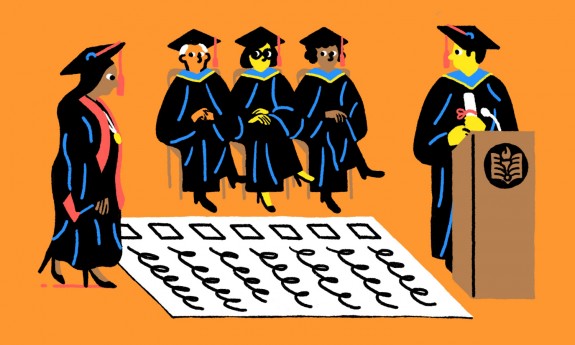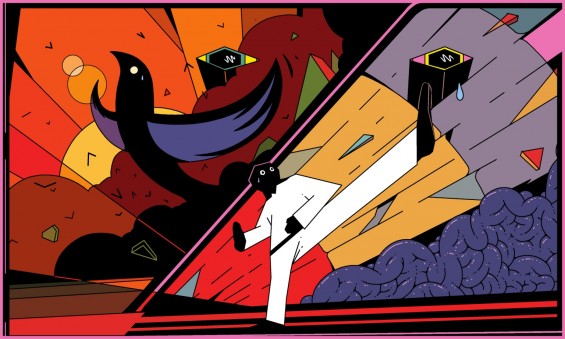
7 things everyone should do while they’re in college
Here are the must-dos that you need to check off your list before you get your diploma, from entrepreneur Liz Wessel.
For those fortunate enough to be able to go, college can feel limitless — full of endless quantities of new people, new ideas, new experiences, and new possibilities. This abundance can be enough to make students lose sight of a hard fact: College isn’t forever. That’s why Liz Wessel, entrepreneur and founder of Way Up, a US-based job site for college students and recent grads, wants people to seize all of those opportunities now — before graduation.
“I have too many friends who have graduated from school after spending hundreds of thousands of dollars on their education, after spending four years of their life, if not more … and then they come and they tell me how much they regret not doing something [during college],” says Wessel in a TEDxRutgers talk.
To prevent you from feeling those future pangs, she shares the 7 things she thinks every student should do before they leave campus for good:
1. Send out cold emails (even if you don’t want to).
Think about someone you’d really like to meet — maybe it’s a distinguished alumna of your college, a writer whose work has changed your outlook, or a person who is a pioneer in an industry you’re curious about. Then, find their email address (“there are a million tricks and hacks on how to do it online,” says Wessel), and start a conversation with them.
It worked for Wessel. By the end of her senior year at the University of Pennsylvania, she had two job offers: one was to be a product marketing manager at Google, and the other was for a position at a venture capital fund. Both positions seemed great, but Wessel was torn. While she wasn’t quite sure what either role entailed, she did know that she wanted to start a company within a few years after graduation. So she emailed a venture capitalist, told him she was a student at Penn and trying to figure out her life, and explained her dilemma. He replied and told her if she wanted to start a business some day, she should take the job at Google.
Why you should do this while you’re still in college:
For many people, sending out cold emails can be awkward, uncomfortable, maybe even an exercise in rejection. But one major reason to look beyond your doubts and do it anyway is because you’re still a student. As Wessel puts it, “Everyone in the world wants to help college students, so please use that to your advantage.”
But do not bury this advantage deep in your email. Wessel adds, “In your first sentence in your cold email, you should be saying, ‘Hi, my name is ___ and I’m a college student at ___ .’” And if there’s any other connection you share with the person — they went to the same elementary school as you, volunteer for the same cause, support the same sports team — mention that up front, too.
2. Find your five.
Wessell credits her present success to the people she met when she was in college: “I would not be where I am today at all had I not made the friends that I made.”
Her recommendation:“Befriend five people who you would bet on … If you’re truly friends after you graduate, they’re gonna help you and you’re gonna help them.” By “bet on,” this doesn’t mean they must all be future-Time-magazine-cover material; rather, they’re people you like and admire and seem to be on a trajectory to make their mark on the world. Through your life, they’ll also serve as your personal board of directors, or legion of superheroes, as coach and consultant Tania Katan puts it.
Why you should do this while you’re still in college:
Wessel says, “There’s never going to be a time again where there are going to be … thousands of brilliant minds around you, learning alongside you, except when you’re in college.”
3. Take a class that teaches a practical skill.
While Wessell truly enjoyed studying the subjects she majored and minored in — political science, Japanese and math — one elective she took has proven to be surprisingly beneficial. She says, “That one graphic design class has helped me in my day-to-day life more than all of my other classes combined.”
For Wessell’s WayUp cofounder, it was a negotiation class he took in college. Now, she says, “he’s the guy who negotiates when we get term sheets from venture capital funds.”
Why you should do this while you’re still in college:
Even if your first job aligns perfectly with your major, the working world will inevitably call on other parts of you. That’s why it’s smart to acquire a skill or skills — such as the ones just mentioned — that will provide you with tools and a perspective which you can apply to a variety of fields. “If you take one class in a very practical skill, whether it’s a computer science class, a negotiation class, or a writing class, it will pay off dividends,” says Wessel.
4. Start something.
Wessell realized she was an entrepreneur in college, and she doubts she would have started WayUp if she hadn’t launched a business as an undergrad when she was 19. There are so many kinds of things you can start — while it could be a business, it might be an extracurricular club, a publication, a public-service drive or campaign, a film series, a TEDx event (apply here), or anything else you can dream up.
Why you should do this while you’re still in college:
Conceiving of a venture, bringing it into reality, and keeping it going will provide you with an education like no other. It also preps you for future jobs, no matter what they may be. “Once you get into the real world of work, you’re going to see that executing projects is pretty much all you do, and it’s really hard,” says Wessel. “It’s great to get that experience during college.”
Similar to cold emailing, college students have a tremendous built-in advantage here. Says Wessel, “corporate sponsors are way more willing to help you when you say you’re a student and this is a university project … versus you’re just another recent grad.” Plus, on campus, there are professors, deans and staff to advise you, competitions and grants to earn seed money, peers who’d like to collaborate, and auditoriums, offices, conference rooms and other facilities to use. Make use of all these resources while you can.
5. Find the professor.
“Everyone’s ‘the professor’ is different,” Wessell says. How to identify them: They’re the one who teaches the class that sets your mind on fire (in a good way), conducts research in the precise area that you’re passionate about, or sees the world in such a distinctive way that you can know you can learn from them.
When she was at Penn, Wessell was determined to study with a particular expert in entrepreneurship — only to learn that undergrads couldn’t take his courses. She kept showing up at the professor’s office until she was finally granted permission. He later helped Wessel with a business plan, which provided the foundation for WayUp, and they’ve stayed in touch. “I can safely say that professor changed my life,” she says.
Why you should do this while you’re still in college:
It’s so much easier to find the professor when you’re at college — and much harder after.
6. Go on an adventure.
While there are many great things about life after college, vacations aren’t usually one of them — at least not for entry-level employees. Unless you’re a teacher or get a job in education, Wessel says, “there’s no such thing as spring or summer break. There’s barely a winter break.”
One summer during college, Wessel had a marketing internship in Tokyo and it made her realize that she wanted to work abroad sometime after graduation. Thanks to the experience, she eventually led a brand team in India for Google.
Why you should do this while you’re still in college:
“You’re never going to have the opportunity [later in life] to just be carefree,” explains Wessel. Take the time while you’re in college — even if it’s for a week in summer — to have a completely new experience. She says, “Figure out where’s your comfort zone. Do you like being out of your comfort zone? Or do you like being in it? What do you enjoy doing?” Get a job abroad, go on a road trip, take a workshop or class at another college or school.
7. Get as much work experience as possible.
Although Wessell suggests logging as many on-the-job hours as possible, she cautions, “I don’t mean [that you should] have one internship you do every single summer, or [that you should] be a camp counselor every single summer, or be a receptionist at the local dentist every weekend.” Instead, try out as many different kinds of work experiences as you can.
Why you should do this while you’re still in college:
It’s a time when you can job-hop without looking unreliable or flaky. “During college, you’re totally OK to have a new internship every summer; you’re totally OK to have a job every year of college, maybe even every semester,” Wessel says. “When you graduate from college, if you have a new job every six months, that looks really bad.”
Doing a variety of jobs is the best way for you to figure out what you want to do after college — and, just as important, what you don’t want to do. Wessel explains, “This is the time you should figure out what you love doing, what you hate doing, what you’re good at, what you’re bad at.”
Watch her TEDxRutgers talk now:
ABOUT THE AUTHOR
Daniella Balarezo is a Media Fellow at TEDx. She is also a writer and comedian based in NYC.
This post was originally published on TED Ideas. It’s part of the “How to Be a Better Human” series, each of which contains a piece of helpful advice from someone in the TED community; browse through all the posts here.




